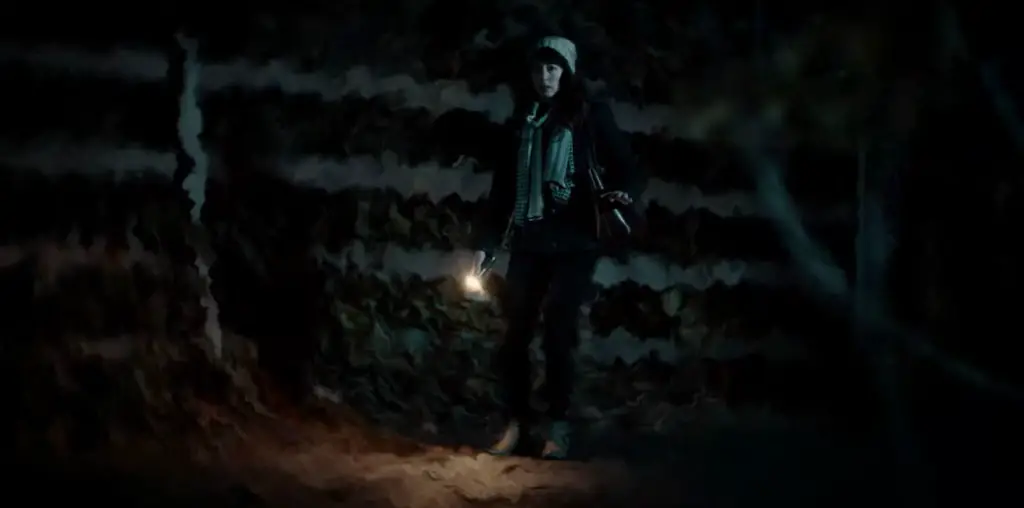
What do you do when the only source of happiness in your life picks up and leaves? You get through your crappy telemarketing job, horrible workmates, and bad traffic every single day just to come home and find that happiness waiting for you, and then it’s suddenly gone. How do you react to something like that? “Say Uncle” is a sad and human exploration of loss, and your ability to cope with loss. When your happiness is taken away, what do you do? How do you cope? Well, my reaction, as would be many others is: you’d lose it. “Say Uncle” is pretty much in theme of “Garden State” in which characters without much in their lives find that there’s much more there through each other, and through losing one another.
However, Paige’s film is also a constantly evolving entity that starts as a bittersweet dramedy forming into a film with an actual relevant and cautionary message. Paige’s film is admittedly not perfect, as it meanders into all sorts of directions, and has a very Capra-esque approach to it in many respects (would you invite someone who stands outside your house in for games?), but I enjoyed it mainly because of Paige’s truly sad performance as a young gay man who visits his friend’s everyday, and plays with his god son for hours. But one day they reveal that they’re moving to China, and then Paul slips into his own world of anguish, and naiveté. He begins to display an alarming amount of denial even walking into the house long after his friends leave and disturbing a young couple, yet manages to befriend the wife (Gabrielle Union).
And then it gets even more unsettling. “Say Uncle” is a consistently provoking dark comedy that not only sheds light on our cynical society, but on mentally unstable people who find solace in children. Peter begins hanging around playgrounds, toy stores, and even attempts to adopt a child, all the while, leaving the audience to wonder if he is a potential child molester, a man with a mental imbalance, or just a man with a Peter Pan complex. Paige touches on many misconceptions in society even humorously approaching the common misapprehension that if someone is gay they’re more prone to depraved sexual activity, and Paul’s efforts to be around children regardless of consequence.
Its clear Paul isn’t well, but we can’t help but wonder what he’s capable of in his desperation for companionship. Meanwhile, Kathy Najimy, in her usual scene stealing persona, plays a lonely housewife who discovers Paul in a playground, and learns he has no children and immediately builds a large pedophilia press campaign based around him and her rash assumptions. “Say Uncle” is a very intriguing dramedy that explores many societal themes about pedophilia, our ability to cope with loss, and the consequences of good intentions. But, one truly alarming aspect of this film is how far he’s actually able to get into the lives of these children, and how easily he’s able to incorporate himself with them. He hangs around children at a toy store, is able to talk to them, plays with them, helps a little girl to the bathroom barely being noticed by anyone, and even invites a boy selling candy into his apartment, while you’re left in awe wondering why in the name of god these parents don’t teach their children about strangers. I can assure you you’ll ask “Where are their parents?” at least once during the course of the story.
And why does it take a seemingly innocent man hanging around children for these complacent self-involved parents to wake up and protect them? Paul stands as more of a martyr for awareness than he does for a man who loves children. He has no ill-intentions when involving himself with kids, but the cynicism of the world he’s in causes it to wake up to the potential dangers, and these self-righteous parents are intent on jailing him just to make themselves feel better, all because he can’t deal with the fact that his best friends are gone. What is funny is that at one scene Najimy’s character is hosting a press conference while her children are in the back out in the open engaging in dangerous activity. One aspect that makes Paige’s film stand out is that it never becomes formulaic even when the climax does become cheesy with a monologue, and a comedic lynch mob. But through its flaws, “Say Uncle” is both a heartbreaking tale of loss, and a cautionary tale to parents out there, and there won’t be a dry eye in the house when the film is finished.
